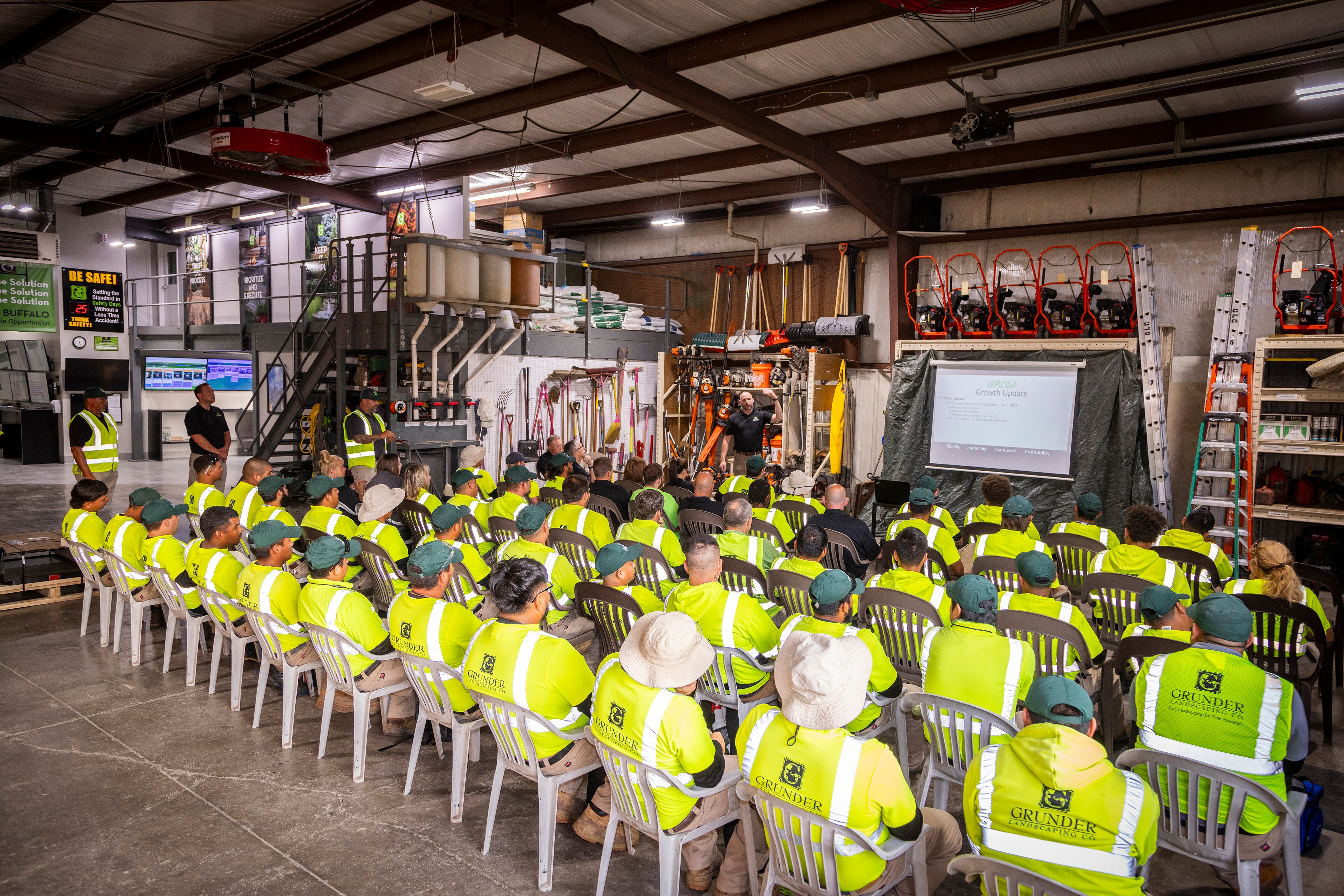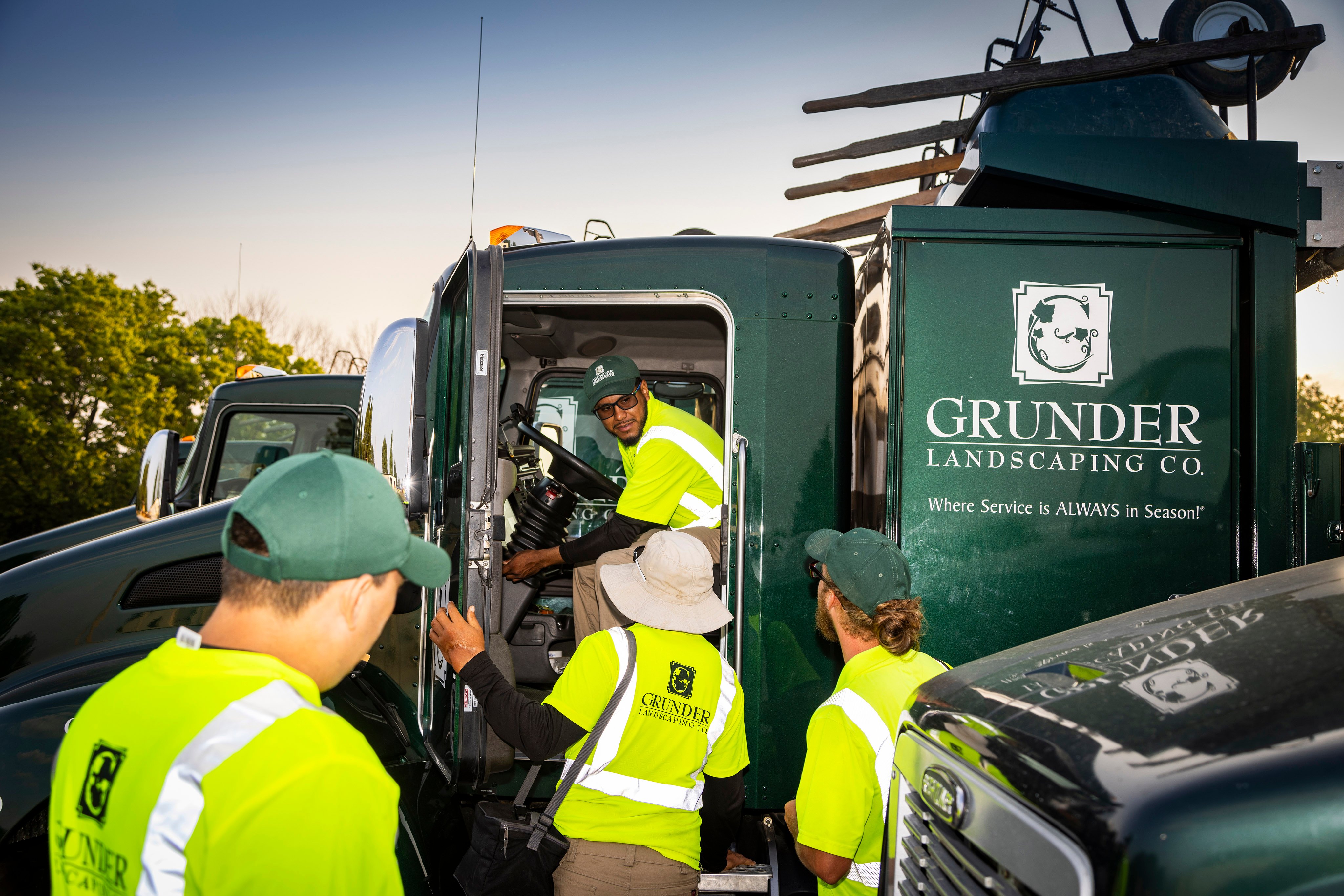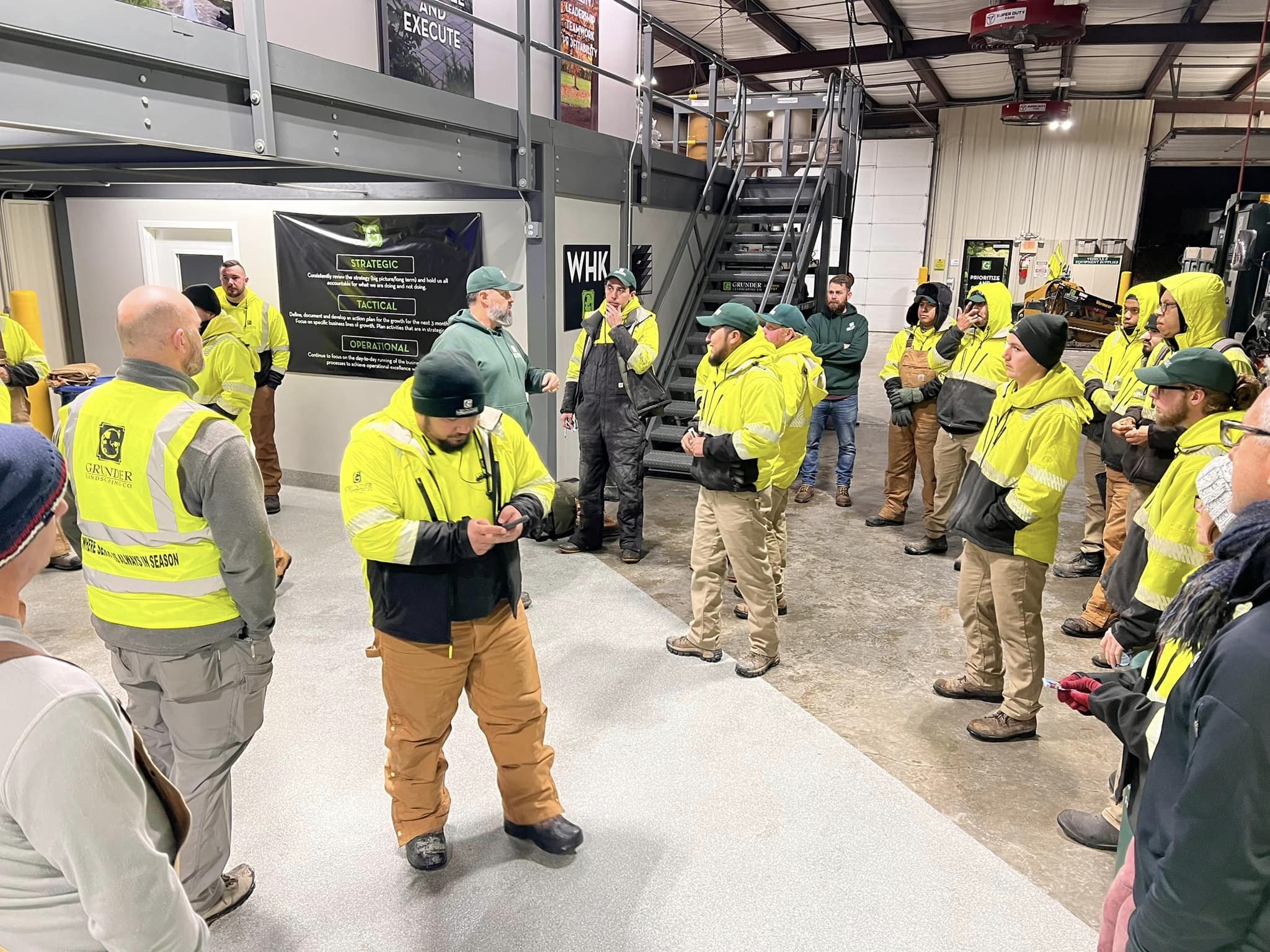
Finding good landscape employees is one of the toughest challenges landscaping business owners face right now. Labor shortages, high turnover, and competition from other industries have turned hiring from something you do when needed into something you think about constantly. But with the right approach, you can build a reliable team that supports growth and delivers quality work.
Hiring Landscaping Employees for Your Business
Hiring for a landscaping business isn't just about filling open positions. It's about finding people who can do the work, fit with your company's approach, and stick around long enough to become productive team members who grow with the company.
A good hiring process helps you identify qualified candidates while avoiding the mistakes that lead to bad hires, wasted training time, and increased turnover. The goal isn't to fill a spot with a warm body - it's to find reliable people who share your company's values and can grow with your business.
Hiring the right people directly affects your ability to serve clients well, maintain quality standards, and grow profitably. Poor hiring practices lead to increased training costs, quality issues on job sites, and damage to client relationships that took years to build.
When Your Landscaping Business Actually Needs to Hire

Before posting job openings, figure out whether you actually need new employees or if other solutions might address your challenges. Look at your current workforce and identify specific areas where new hires are necessary, instead of hiring reactively when you're already overwhelmed.
Think about your busy season vs winter work and potential business expansion when deciding to hire. Some landscaping businesses need temporary employees for peak seasons while others require full-time staff for year-round operations. The decision depends on your specific business model and growth plans.
Many landscaping companies struggle to maintain stable workforces because of labor shortages affecting the entire industry. Seasonal demand changes make it harder to keep consistent staffing levels throughout the year.
Job Postings That Attract Qualified Candidates
Write clear job descriptions that outline the specific responsibilities of each landscaping position. Use relevant keywords like "landscaping," "lawn care," and location-specific terms so potential employees can find your postings when searching online.
Specify the skills and qualifications for each position to filter out unqualified candidates before they apply. Include information about your company culture and values to attract people who'll fit well with your existing team.
A good job description explains the tasks and responsibilities in straightforward language that candidates understand. Include the pay rate in job ads to attract serious candidates - transparency about compensation saves everyone time and shows you're serious about paying people fairly.
Landscaping Crew Member
Job Ads/Job Boards to Reach the Right People
Use online job boards and social media platforms to reach job seekers actively looking for landscaping jobs.
Advertising and posting widely through multiple channels increases your chances of finding qualified candidates who might not see your posting on just one platform. Using social media to showcase company culture and work environment helps potential employees understand what it's actually like to work at your company.
Ask current employees to share job openings with their networks - job seekers they know tend to be better quality hires who stay longer. Employee referral programs encourage staff to refer potential hires by offering bonuses or other incentives when their referrals get hired and complete probationary periods.
Word-of-mouth recommendations are powerful tools in recruiting landscape employees. Companies that promote career growth opportunities and stability in their landscaping marketing tend to attract candidates looking for long-term employment rather than just seasonal work.
Finding and Screening Candidates
Screen resumes and cover letters carefully to identify qualified candidates who have relevant experience. Conduct initial interviews to assess each candidate's skills, experience, and fit with your company culture before investing time in detailed evaluations. While you can't know 100% if they'll succeed until they're doing the job, this will give you a good start.
Recruiting qualified landscape workers involves using diverse channels like networking events and partnerships with horticultural schools. Consider hiring people with experience in related fields, such as construction or gardening. They often bring skills that apply well to landscaping work.
Interviews should go beyond standard questions to assess problem-solving skills and specific equipment experience relevant to your operations. Finding reliable and skilled staff is a constant challenge, so developing effective screening processes saves time and improves hiring outcomes.

Evaluating Candidates Thoroughly
Evaluate candidates based on their skills, experience, and fit with your company culture, not just their technical abilities. Conduct thorough interviews that assess the candidate's knowledge and experience in landscaping while also getting a sense of how they approach problems and interact with others.
Background checks, reference checks, and interviews are essential parts of the screening process. Check references carefully and perform background checks to ensure candidates are reliable and trustworthy before extending job offers.
Consider conducting skills tests or assessments to evaluate candidates' actual abilities rather than just taking their word for what they can do. Evaluate each candidate's long-term potential and ability to grow with your company - the best hires are people who can take on more responsibility as your business expands.
The physical demands of landscaping jobs can deter some potential employees, so be upfront about the realities of the work during interviews. Competition for top talent in the landscaping industry is tough, which means thorough evaluation helps identify candidates most likely to succeed and stay with your company.
Avoiding Common Hiring Mistakes
Don't rush the hiring process. Taking time to find the right candidate prevents costly mistakes that hurt your business. Don't overlook the importance of cultural fit when evaluating candidates. Skills can be taught, but ensuring candidates share your company's values and work approach is harder to change after they're hired.
Be aware of potential issues like burnout and high turnover that affect the landscaping industry. The industry faces high turnover rates due to various factors including seasonal work patterns, physical demands, and better-paying opportunities in other sectors.
Create a solid onboarding process to ensure new employees are well-trained and supported from day one. Avoid making bad hiring decisions by thoroughly evaluating candidates rather than hiring the first person who seems somewhat qualified because you're desperate to fill positions.
Hiring new employees for landscaping or lawn care businesses can be challenging. Many companies need to replace new hires multiple times before finding the right fit. Being prepared for trial and error prevents frustration and helps maintain realistic expectations.
Onboarding New Employees Effectively
Develop an onboarding process that ensures new employees receive proper training and support as they learn your systems and standards. A structured onboarding plan helps integrate new hires smoothly into the team and gets them productive faster.

Essential onboarding elements include:
-
Clear job roles and responsibilities from day one
-
Formal offer letter with job title, start date, compensation, benefits, and employment terms
-
Introduction to company values and mission
-
Equipment and safety training with experienced crew members
-
Assigned mentor or team lead for initial guidance
-
Early conversations about career goals and advancement opportunities
At Grunder Landscaping, extending job offers to good candidates at the end of their in-person interview prevents losing quality people to competitors.
Foster positive team dynamics and encourage open communication so new employees feel comfortable asking questions and learning from more experienced crew members. When new employees understand your company's values and mission from the start, they can make good decisions independently as they gain experience.
Building clear career pathways within the company improves retention by giving people reasons to stay and develop their skills rather than looking elsewhere for advancement opportunities.
The Different Types of Landscaping Employees
Building Your Complete Workforce
Four essential employee types for landscaping success
Each type plays a vital role in creating an adaptable, complete team
Full-Time Employees
Full-time employees generally provide more consistent work and better continuity than part-time workers or subcontractors. Employees are legally protected by labor laws which grant them benefits like minimum wage, health insurance, and leave that don't apply to independent contractors.
Employers have a responsibility to provide a safe work environment and necessary training for employees, obligations that may not apply to subcontractors. Health benefits are often required for employees, unlike subcontractors who are responsible for their own insurance and taxes.
Part-Time Workers
Part-time workers have less commitment to a single company and may work multiple jobs, which can cause potential turnover issues. Part-time employees may require incentives like bonuses to increase their hours or commitment to your company.
Subcontractors
Subcontractors are self-employed and not entitled to benefits like health insurance or paid time off. Hiring subcontractors can help complete specialized tasks without the long-term commitment of hiring full-time employees, but they don't build the same connection to your company.
Seasonal Visa Programs
Some landscaping companies facing persistent labor shortages turn to seasonal visa programs to fill critical positions during busy months. These programs allow businesses to bring in temporary workers when local hiring isn't meeting demand. While these programs require advance planning and paperwork, they can provide reliable seasonal help. Some landscaping businesses have found success in sponsoring their most dedicated seasonal workers for permanent residency, turning temporary solutions into long-term team members who are already trained in company systems and culture.
Choosing the Right Mix
Determining the right type of employee - full-time, part-time, or subcontractor - depends on your workload and business needs at any given time. Understanding these differences helps landscaping companies make informed decisions about their workforce composition.
Retaining Your Current Employees
Paying employees well is necessary for keeping good workers in a competitive market. Offering competitive compensation and benefits is key to retaining top talent once you've hired them.
Offering rewards and bonuses can encourage employees to work full time and commit to your company long-term. Employee referral programs often lead to better quality hires who are likely to stay longer because they were recommended by trusted team members.
Creating a positive workplace culture helps retain employees by making your company a place people actually want to work. Investing in ongoing training and development increases job satisfaction and loyalty by showing employees you're invested in their growth.
Maintaining transparent communication builds trust and loyalty among employees who appreciate knowing what's happening in the business. Recognizing and celebrating employee milestones creates a sense of belonging and appreciation that money alone can't buy.
Promoting a positive company culture on websites and social media helps attract and retain employees who align with your values. Companies that understand these retention principles don't just reduce turnover - they build sustainable teams that support long-term growth.

Building Your Hiring System
Hiring landscape employees effectively requires a systematic approach that addresses every stage from identifying needs through long-term retention. The companies that build reliable teams make hiring a daily priority rather than something they only focus on when desperate for help.
The hiring process isn't something you perfect once and forget about. Stay current with industry trends and continuously evaluate and improve your hiring process to attract and retain top talent. Make time every day to focus on building and maintaining a good team - it's as important as any client meeting.
Finding and keeping good workers is an ongoing challenge, but developing clear systems, being transparent about expectations and pay, and treating hiring as a priority rather than an administrative task makes all the difference.

About The Grow Group
The best business advice comes from people who are still doing the work.
Led by Marty Grunder, The Grow Group helps business owners clarify their platform, grow their people, build their processes, and realize profits. The team is still actively involved in the day-to-day operations of Grunder Landscaping, and they've helped hundreds of professionals across the country with their businesses.
The Grow Group doesn't just share theories and ideas. They share tactics used at their own company this week that still work. Grunder Landscaping Co. serves as their "living laboratory" where every system gets tested first.
Ready to improve your hiring process and build a stronger team?
Join Marty Grunder at one of The Grow Group's upcoming events where you'll learn proven systems for finding, hiring, and retaining quality employees. Visit The Grow Group's events page to see what's coming up.
Frequently Asked Questions
What is the biggest challenge in hiring landscape employees?
The biggest challenge in hiring landscape employees is the combination of labor shortages, high turnover rates, and competition from other industries offering better pay or working conditions. Many landscaping companies struggle to maintain stable workforces because seasonal demand fluctuations and the physical demands of the work make it hard to attract and keep qualified workers.
Should I hire full-time or part-time landscape workers?
The decision between full-time and part-time landscape workers depends on your workload and business needs. Full-time employees provide better consistency and continuity, while part-time workers offer flexibility during seasonal fluctuations. Many successful landscaping businesses use a mix of both types depending on their service mix and market conditions.
How can I reduce turnover in my landscaping business?
Reduce turnover by paying competitive wages, offering benefits, creating clear career paths, maintaining positive workplace culture, and providing ongoing training. Employee referral programs also tend to produce hires who stay longer. Investing in retention from day one through solid onboarding and regular communication about growth opportunities makes a significant difference.
Where should I advertise landscaping job openings?
Advertise landscaping job openings on multiple channels including online job boards, social media platforms, industry-specific websites, and through employee referrals. Partner with local vocational schools and network with industry vendors and suppliers. Using diverse recruiting channels increases your chances of finding qualified candidates who fit your company culture.
